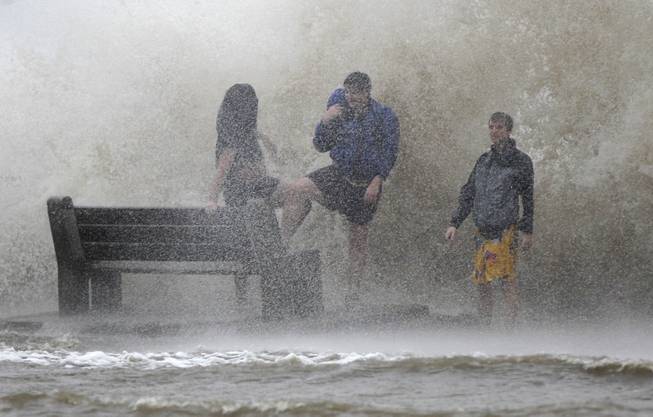
ASSOCIATED PRESS
People walk in the storm surge from Isaac, on Lakeshore Drive along Lake Pontchartrain, as the storm approaches landfall in New Orleans, Tuesday, Aug. 28, 2012. The storm was arriving at the seventh anniversary of Hurricane Katrina, which devastated Louisiana and Mississippi when it struck on Aug. 29, 2005.
Saturday, April 16, 2022 | 2 a.m.
Editor’s note: We interviewed experts, policy makers and community organizers about how climate change is impacting the mental and physical health of residents. These conversations will be presented in “Heating Up,” a podcast with the Sun’s Arleigh Rodgers. At the end of the series, the interviews will be presented in story form. Enjoy.
The process of understanding pre-traumatic, continuous or post-traumatic stress disorder as brought on by climate crisis could be informed by victims of natural disasters like hurricanes.
A February 2021 study from the Journal of the American Medical Association concluded that “disaster exposure is associated with the development of posttraumatic stress symptoms in youths.”
The study followed more than 1,700 American children — with an average age of 9 — who experienced either Hurricane Andrew, which hit Florida and Louisiana in 1992; Hurricane Charley, a 2004 disaster that swept Florida, North Carolina and South Carolina; Hurricane Ike, occurring in 2005 and hitting Texas and Florida, and 2008’s Hurricane Katrina, a catastrophe that ripped through Louisiana, Alabama, and Mississippi, among other states.
The Sun’s Arleigh Rodgers further discusses the connection between climate issues and mental health with Elizabeth Haase, a faculty member at UNR’s school of medicine who is chair of the American Psychiatric Association Climate Committee. She also works with the Climate Psychiatry Alliance, an independent group of climate-concerned professionals.
Take a listen:
Las Vegas Sun
Heating Up: Connection between climate issues and mental health
The Sun’s Arleigh Rodgers discusses the connection between climate issues and mental health with Elizabeth Haase, a faculty member at UNR’s school of medicine who is chair of the American Psychiatric Association Climate Committee. She also works with the Climate Psychiatry Alliance, an independent group of climate-concerned professionals.
